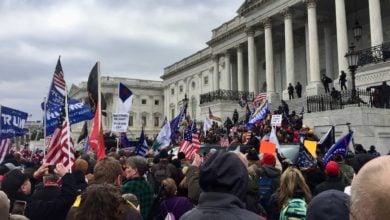After a tense day of
negotiations on July 20, with Mexican officials who at first declared the
Pastors for Peace Caravan to Cuba would not be allowed into Mexico, this
morning the caravan was given the go-ahead from Mexican government.
|
This year’s caravan is dedicated to the Cuban children |
This year’s caravan, of over 100 tons of humanitarian aid and dedicated to the
Cuban children, is the twentieth mission whose main objective is challenging
the U.S. blockade. The Pastors caravan refuses to apply for or accept a U.S.
government license, on the grounds that the blockade is illegal. Despite
international condemnation of the 50-year blockade, the U.S. government maintains
its genocidal policy to try to destabilize the revolution.
The caravan began on various routes in Canada in late June. Participants
stopped and spoke in over 125 U.S. cities along the way, gathering aid and
inspiring people to continue their opposition to the blockade.
After gathering in Texas along
the U.S.-Mexico border for several days, the caravan traditionally crosses with
cars, trucks and school buses filled with “caravanistas” and aid to drive to
the Mexican port city of Tampico. This year’s crossing was from Pharr, near McAllen,
Texas to Reynosa, Mexico.
A Pastors for Peace press communiqué said, “Late last night, during a strategy
session for planning an international campaign to seek the reversal of this
draconian position, we received notification that the central offices of
Mexican customs had relayed an order to the Pharr border officials to allow the
Caravan to continue through the Mexican border as it has been the previous 20
years.
“We applaud the Mexican officials for backing away from what would have been a
disastrous policy regarding the Pastors for Peace Caravan and the delivery of
humanitarian aid to Cuba.”
The next immediate challenge for the caravan is the U.S. customs officials, who
in the past have confiscated school buses destined for Cuba and arrested
caravan participants, for simply expressing solidarity with the Cuban people
against the U.S. blockade. In 1993 seven caravanistas, including PFP director,
the Rev. Lucius Walker, went on a hunger strike for 23 days until the school bus
was freed from the U.S. government. In 1997 caravan participants carried out a
hunger strike for more than 90 days until computers destined for Cuban schools
were released from U.S. customs.
PSLweb readers are urged to
be on the alert for any possible adverse developments as the caravan crosses
the border. As the caravan approached the border this morning, the PFP statement
to the press concluded, “The work of peace and justice is hard work, we are
prepared with your support to continue to certain victory. Si se puede! We
shall overcome.”







